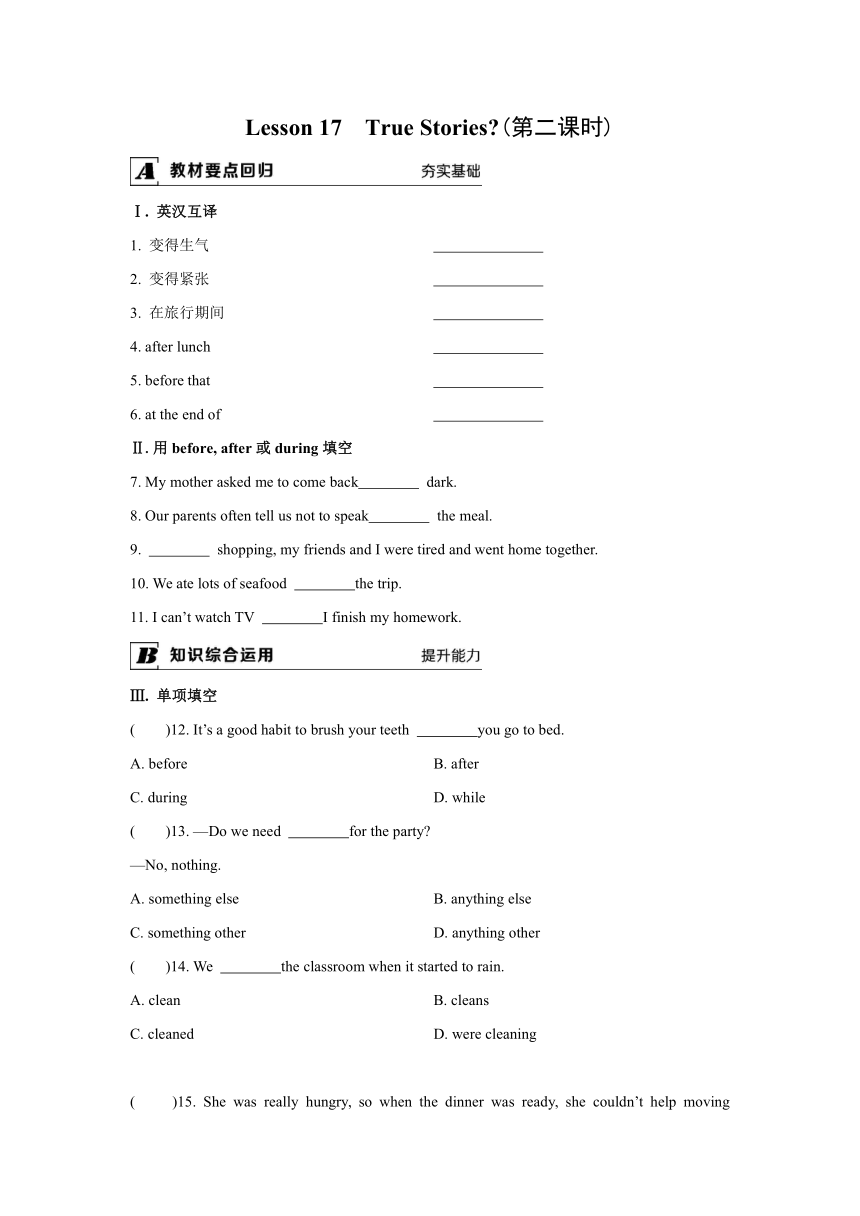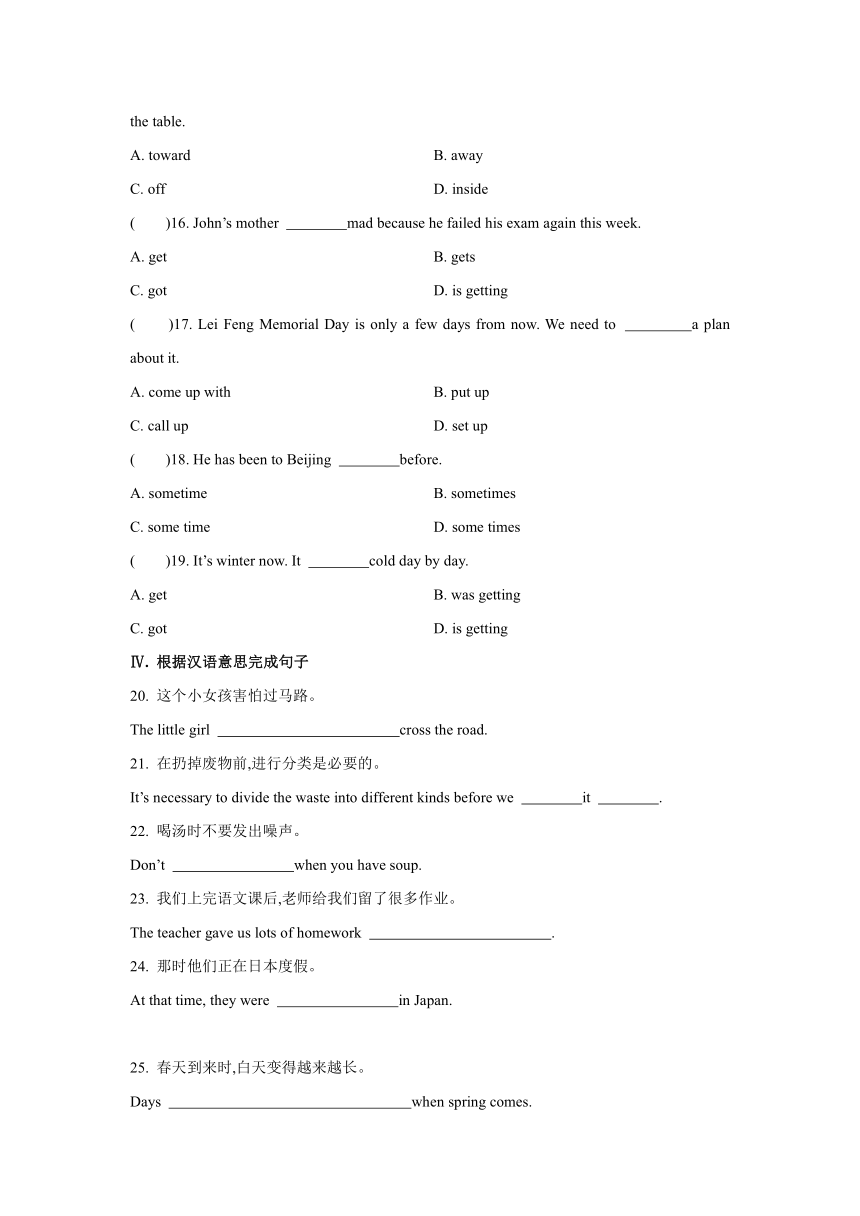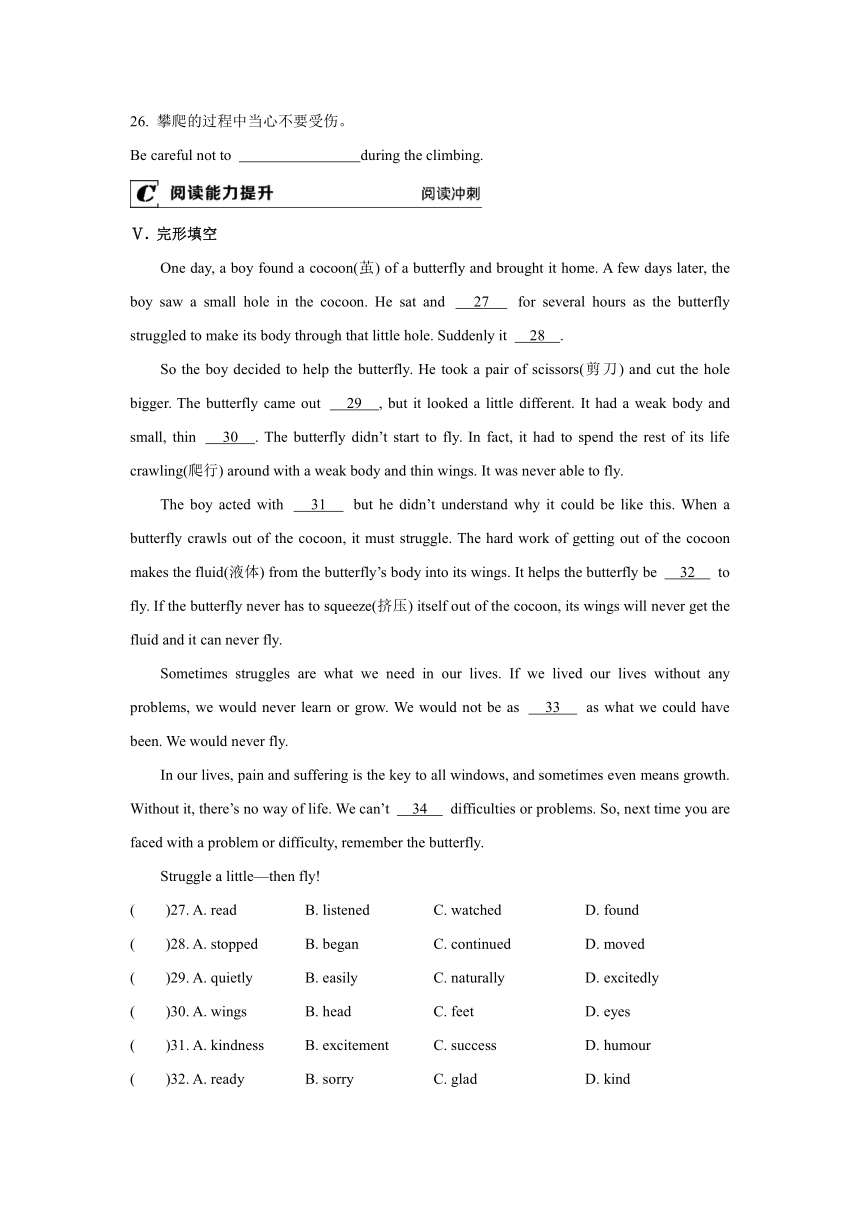同步课时训练:Unit 6 Lesson 17 True Stories ?(第二课时)(word版,含答案)
文档属性
| 名称 | 同步课时训练:Unit 6 Lesson 17 True Stories ?(第二课时)(word版,含答案) |

|
|
| 格式 | docx | ||
| 文件大小 | 117.5KB | ||
| 资源类型 | 教案 | ||
| 版本资源 | 北师大版 | ||
| 科目 | 英语 | ||
| 更新时间 | 2022-04-07 21:41:44 | ||
图片预览



文档简介
Lesson 17 True Stories (第二课时)
Ⅰ. 英汉互译
1. 变得生气
2. 变得紧张
3. 在旅行期间
4. after lunch
5. before that
6. at the end of
Ⅱ.用before, after或during填空
7. My mother asked me to come back dark.
8. Our parents often tell us not to speak the meal.
9. shopping, my friends and I were tired and went home together.
10. We ate lots of seafood the trip.
11. I can’t watch TV I finish my homework.
Ⅲ. 单项填空
( )12. It’s a good habit to brush your teeth you go to bed.
A. before B. after
C. during D. while
( )13. —Do we need for the party
—No, nothing.
A. something else B. anything else
C. something other D. anything other
( )14. We the classroom when it started to rain.
A. clean B. cleans
C. cleaned D. were cleaning
( )15. She was really hungry, so when the dinner was ready, she couldn’t help moving the table.
A. toward B. away
C. off D. inside
( )16. John’s mother mad because he failed his exam again this week.
A. get B. gets
C. got D. is getting
( )17. Lei Feng Memorial Day is only a few days from now. We need to a plan about it.
A. come up with B. put up
C. call up D. set up
( )18. He has been to Beijing before.
A. sometime B. sometimes
C. some time D. some times
( )19. It’s winter now. It cold day by day.
A. get B. was getting
C. got D. is getting
Ⅳ. 根据汉语意思完成句子
20. 这个小女孩害怕过马路。
The little girl cross the road.
21. 在扔掉废物前,进行分类是必要的。
It’s necessary to divide the waste into different kinds before we it .
22. 喝汤时不要发出噪声。
Don’t when you have soup.
23. 我们上完语文课后,老师给我们留了很多作业。
The teacher gave us lots of homework .
24. 那时他们正在日本度假。
At that time, they were in Japan.
25. 春天到来时,白天变得越来越长。
Days when spring comes.
26. 攀爬的过程中当心不要受伤。
Be careful not to during the climbing.
Ⅴ. 完形填空
One day, a boy found a cocoon(茧) of a butterfly and brought it home. A few days later, the boy saw a small hole in the cocoon. He sat and 27 for several hours as the butterfly struggled to make its body through that little hole. Suddenly it 28 .
So the boy decided to help the butterfly. He took a pair of scissors(剪刀) and cut the hole bigger. The butterfly came out 29 , but it looked a little different. It had a weak body and small, thin 30 . The butterfly didn’t start to fly. In fact, it had to spend the rest of its life crawling(爬行) around with a weak body and thin wings. It was never able to fly.
The boy acted with 31 but he didn’t understand why it could be like this. When a butterfly crawls out of the cocoon, it must struggle. The hard work of getting out of the cocoon makes the fluid(液体) from the butterfly’s body into its wings. It helps the butterfly be 32 to fly. If the butterfly never has to squeeze(挤压) itself out of the cocoon, its wings will never get the fluid and it can never fly.
Sometimes struggles are what we need in our lives. If we lived our lives without any problems, we would never learn or grow. We would not be as 33 as what we could have been. We would never fly.
In our lives, pain and suffering is the key to all windows, and sometimes even means growth. Without it, there’s no way of life. We can’t 34 difficulties or problems. So, next time you are faced with a problem or difficulty, remember the butterfly.
Struggle a little—then fly!
( )27. A. read B. listened C. watched D. found
( )28. A. stopped B. began C. continued D. moved
( )29. A. quietly B. easily C. naturally D. excitedly
( )30. A. wings B. head C. feet D. eyes
( )31. A. kindness B. excitement C. success D. humour
( )32. A. ready B. sorry C. glad D. kind
( )33. A. wise B. quiet C. strong D. patient
( )34. A. cause B. avoid C. face D. have
Ⅵ. 阅读理解
Many have seen koalas. This kind of animal that only lives in Australia is listed among Australia’s endangered animals. A recent survey showed that if we don’t take action to protect them, koalas will disappear in New South Wales, Australia in 2050. According to Australian Koala Foundation, there were only fewer than 80,000 koalas in Australia last year.
Australia is known as home to koalas. There used to be lots of koalas there. But habitat loss and disease have done harm to koalas. Especially the forest fire that happened in 2019 and 2020 in New South Wales had a great effect on koalas. About 5,000 are thought to have died, and more than 500 million hectares(公顷) of forests were burned in one of the worst forest fires in Australian history. That means koalas have lost almost a quarter of habitat.
Across the rest of the country, the number of koalas is falling. But effective measures(有效的措施) have not been taken to protect koalas.
“The koalas are losing their homes and the future of the koalas is in danger,” an officer warned. “If we don’t take action now, people in the future may not see a koala in the wild again. ”
Luckily, to protect the koalas, Australian Koala Foundation has made a number of suggestions, including setting up new national parks and reducing land clearing. In a statement(声明), the New South Wales Environment Minister said his state would do everything it could to protect koalas for future people.
We hope that the koalas can live happily in Australia as they used to.
( )35. What can we know from the first paragraph
A. The koalas won’t be seen in New South Wales in 2050.
B. There are about 80,000 koalas living in Australia now.
C. The koalas are endangered in Australia now.
D. A survey about the koalas’ living conditions is being made now.
( )36. What does the underlined word “habitat” in Paragraph 2 mean in Chinese
A. 栖息地 B. 食物
C. 原产地 D. 生态系统
( )37. What does the writer want to tell us
A. Effective measures must be taken to protect koalas.
B. How people are protecting koalas in Australia.
C. We can’t do much to support koala protection.
D. Why koalas are important to Australia.
( )38. In which part of a newspaper may this text appear
A. Travel. B. News.
C. Sports. D. Lifestyle.
答案
Lesson 17 True Stories (第二课时)
Ⅰ. 1. get angry 2. get nervous
3. during the trip 4. 午饭后
5. 在那之前 6. 在……的末尾
Ⅱ. 7. before 8. during 9. After
10. during 11. before
Ⅲ. 12. A 句意:上床睡觉前刷牙是一个好习惯。
13. B 在一般疑问句中,不定代词常用anything,else需放在不定代词之后。
14. D
15. A 考查介词辨析。toward表示“朝;向”,符合句意“她是真饿了,因此当晚饭准备好时,她不由自主地向着餐桌移动”。故答案为A。
16. C
17. A come up with意为“想出,提出”;put up意为“张贴”; call up意为“使想起”;set up意为“建立”。根据语境可知选A。
18. D 句意:他以前去过北京几次。 sometime意为“某时”;sometimes意为“有时”;some time意为“一段时间”;some times意为“几次,几倍”。故选D。
19. D
Ⅳ. 20. is scared/afraid to
21. throw, away
22. make noise(s)
23. after our Chinese class
24. on holiday/vacation
25. get longer and longer
26. get hurt
Ⅴ. 【主旨大意】 这篇文章主要通过一只蝴蝶经过小男孩的帮助从茧里出来的故事,告诉我们一个道理:当我们遇到问题或困难时,多奋斗一下,就能起飞。
27. C 考查动词。read意为“读”;listen意为“听”;watch意为“观察;看”;find意为“发现”。根据句意及上下文可知,他坐着观察了几个小时。故选C。
28. A 考查动词。 stop意为“停止”;begin意为“开始”;continue意为“继续”;move意为“移动”。根据下文男孩想帮助一下蝴蝶可知,它突然停止了。故选A。
29. B 考查副词。quietly意为“静静地”;easily意为“容易地”;naturally意为“自然地”;excitedly意为“兴奋地”。小男孩用剪刀把洞剪得比较大,蝴蝶很容易地出来了。故选B。
30. A 考查名词。wing意为“翅膀”;head意为“头”;foot意为“脚”;eye意为“眼睛”。根据下句“The butterfly didn’t start to fly. ”可知,它有又小又薄的翅膀。由本段倒数第二句中的“thin wings”也可知选A。
31. A 考查名词。kindness意为“善良”;excitement意为“兴奋”; success意为“成功”; humour意为“幽默”。男孩好心做了这件事,但他不理解为什么是这样的。故选A。
32. A 33. C 34. B
Ⅵ. 【主旨大意】 呆萌的考拉一直倍受人们的喜爱,然而在澳大利亚,考拉的生存环境正受到威胁。最近的一项调查显示如果不采取有效措施保护考拉,2050年考拉将在新南威尔士州灭绝。
35. C 细节理解题。由第一段中的“This kind of animal that only lives in Australia is listed among Australia’s endangered animals. ”可知,考拉在澳大利亚正濒临灭绝。
36. A 词义猜测题。根据第二段后半部分提到的澳大利亚森林大火对考拉生存造成的影响可推断出,habitat表示“栖息地”的意思。
37. A 推理判断题。由全文整体内容判断,作者在这篇文章中对考拉的生存环境以及考拉濒临灭绝的情况进行介绍,旨在呼吁保护考拉。
38. B 推理判断题。由全文整体内容判断,这是一则介绍澳大利亚考拉生存状况、呼吁保护考拉的新闻,所以可能在报纸的新闻版块出现。
Ⅰ. 英汉互译
1. 变得生气
2. 变得紧张
3. 在旅行期间
4. after lunch
5. before that
6. at the end of
Ⅱ.用before, after或during填空
7. My mother asked me to come back dark.
8. Our parents often tell us not to speak the meal.
9. shopping, my friends and I were tired and went home together.
10. We ate lots of seafood the trip.
11. I can’t watch TV I finish my homework.
Ⅲ. 单项填空
( )12. It’s a good habit to brush your teeth you go to bed.
A. before B. after
C. during D. while
( )13. —Do we need for the party
—No, nothing.
A. something else B. anything else
C. something other D. anything other
( )14. We the classroom when it started to rain.
A. clean B. cleans
C. cleaned D. were cleaning
( )15. She was really hungry, so when the dinner was ready, she couldn’t help moving the table.
A. toward B. away
C. off D. inside
( )16. John’s mother mad because he failed his exam again this week.
A. get B. gets
C. got D. is getting
( )17. Lei Feng Memorial Day is only a few days from now. We need to a plan about it.
A. come up with B. put up
C. call up D. set up
( )18. He has been to Beijing before.
A. sometime B. sometimes
C. some time D. some times
( )19. It’s winter now. It cold day by day.
A. get B. was getting
C. got D. is getting
Ⅳ. 根据汉语意思完成句子
20. 这个小女孩害怕过马路。
The little girl cross the road.
21. 在扔掉废物前,进行分类是必要的。
It’s necessary to divide the waste into different kinds before we it .
22. 喝汤时不要发出噪声。
Don’t when you have soup.
23. 我们上完语文课后,老师给我们留了很多作业。
The teacher gave us lots of homework .
24. 那时他们正在日本度假。
At that time, they were in Japan.
25. 春天到来时,白天变得越来越长。
Days when spring comes.
26. 攀爬的过程中当心不要受伤。
Be careful not to during the climbing.
Ⅴ. 完形填空
One day, a boy found a cocoon(茧) of a butterfly and brought it home. A few days later, the boy saw a small hole in the cocoon. He sat and 27 for several hours as the butterfly struggled to make its body through that little hole. Suddenly it 28 .
So the boy decided to help the butterfly. He took a pair of scissors(剪刀) and cut the hole bigger. The butterfly came out 29 , but it looked a little different. It had a weak body and small, thin 30 . The butterfly didn’t start to fly. In fact, it had to spend the rest of its life crawling(爬行) around with a weak body and thin wings. It was never able to fly.
The boy acted with 31 but he didn’t understand why it could be like this. When a butterfly crawls out of the cocoon, it must struggle. The hard work of getting out of the cocoon makes the fluid(液体) from the butterfly’s body into its wings. It helps the butterfly be 32 to fly. If the butterfly never has to squeeze(挤压) itself out of the cocoon, its wings will never get the fluid and it can never fly.
Sometimes struggles are what we need in our lives. If we lived our lives without any problems, we would never learn or grow. We would not be as 33 as what we could have been. We would never fly.
In our lives, pain and suffering is the key to all windows, and sometimes even means growth. Without it, there’s no way of life. We can’t 34 difficulties or problems. So, next time you are faced with a problem or difficulty, remember the butterfly.
Struggle a little—then fly!
( )27. A. read B. listened C. watched D. found
( )28. A. stopped B. began C. continued D. moved
( )29. A. quietly B. easily C. naturally D. excitedly
( )30. A. wings B. head C. feet D. eyes
( )31. A. kindness B. excitement C. success D. humour
( )32. A. ready B. sorry C. glad D. kind
( )33. A. wise B. quiet C. strong D. patient
( )34. A. cause B. avoid C. face D. have
Ⅵ. 阅读理解
Many have seen koalas. This kind of animal that only lives in Australia is listed among Australia’s endangered animals. A recent survey showed that if we don’t take action to protect them, koalas will disappear in New South Wales, Australia in 2050. According to Australian Koala Foundation, there were only fewer than 80,000 koalas in Australia last year.
Australia is known as home to koalas. There used to be lots of koalas there. But habitat loss and disease have done harm to koalas. Especially the forest fire that happened in 2019 and 2020 in New South Wales had a great effect on koalas. About 5,000 are thought to have died, and more than 500 million hectares(公顷) of forests were burned in one of the worst forest fires in Australian history. That means koalas have lost almost a quarter of habitat.
Across the rest of the country, the number of koalas is falling. But effective measures(有效的措施) have not been taken to protect koalas.
“The koalas are losing their homes and the future of the koalas is in danger,” an officer warned. “If we don’t take action now, people in the future may not see a koala in the wild again. ”
Luckily, to protect the koalas, Australian Koala Foundation has made a number of suggestions, including setting up new national parks and reducing land clearing. In a statement(声明), the New South Wales Environment Minister said his state would do everything it could to protect koalas for future people.
We hope that the koalas can live happily in Australia as they used to.
( )35. What can we know from the first paragraph
A. The koalas won’t be seen in New South Wales in 2050.
B. There are about 80,000 koalas living in Australia now.
C. The koalas are endangered in Australia now.
D. A survey about the koalas’ living conditions is being made now.
( )36. What does the underlined word “habitat” in Paragraph 2 mean in Chinese
A. 栖息地 B. 食物
C. 原产地 D. 生态系统
( )37. What does the writer want to tell us
A. Effective measures must be taken to protect koalas.
B. How people are protecting koalas in Australia.
C. We can’t do much to support koala protection.
D. Why koalas are important to Australia.
( )38. In which part of a newspaper may this text appear
A. Travel. B. News.
C. Sports. D. Lifestyle.
答案
Lesson 17 True Stories (第二课时)
Ⅰ. 1. get angry 2. get nervous
3. during the trip 4. 午饭后
5. 在那之前 6. 在……的末尾
Ⅱ. 7. before 8. during 9. After
10. during 11. before
Ⅲ. 12. A 句意:上床睡觉前刷牙是一个好习惯。
13. B 在一般疑问句中,不定代词常用anything,else需放在不定代词之后。
14. D
15. A 考查介词辨析。toward表示“朝;向”,符合句意“她是真饿了,因此当晚饭准备好时,她不由自主地向着餐桌移动”。故答案为A。
16. C
17. A come up with意为“想出,提出”;put up意为“张贴”; call up意为“使想起”;set up意为“建立”。根据语境可知选A。
18. D 句意:他以前去过北京几次。 sometime意为“某时”;sometimes意为“有时”;some time意为“一段时间”;some times意为“几次,几倍”。故选D。
19. D
Ⅳ. 20. is scared/afraid to
21. throw, away
22. make noise(s)
23. after our Chinese class
24. on holiday/vacation
25. get longer and longer
26. get hurt
Ⅴ. 【主旨大意】 这篇文章主要通过一只蝴蝶经过小男孩的帮助从茧里出来的故事,告诉我们一个道理:当我们遇到问题或困难时,多奋斗一下,就能起飞。
27. C 考查动词。read意为“读”;listen意为“听”;watch意为“观察;看”;find意为“发现”。根据句意及上下文可知,他坐着观察了几个小时。故选C。
28. A 考查动词。 stop意为“停止”;begin意为“开始”;continue意为“继续”;move意为“移动”。根据下文男孩想帮助一下蝴蝶可知,它突然停止了。故选A。
29. B 考查副词。quietly意为“静静地”;easily意为“容易地”;naturally意为“自然地”;excitedly意为“兴奋地”。小男孩用剪刀把洞剪得比较大,蝴蝶很容易地出来了。故选B。
30. A 考查名词。wing意为“翅膀”;head意为“头”;foot意为“脚”;eye意为“眼睛”。根据下句“The butterfly didn’t start to fly. ”可知,它有又小又薄的翅膀。由本段倒数第二句中的“thin wings”也可知选A。
31. A 考查名词。kindness意为“善良”;excitement意为“兴奋”; success意为“成功”; humour意为“幽默”。男孩好心做了这件事,但他不理解为什么是这样的。故选A。
32. A 33. C 34. B
Ⅵ. 【主旨大意】 呆萌的考拉一直倍受人们的喜爱,然而在澳大利亚,考拉的生存环境正受到威胁。最近的一项调查显示如果不采取有效措施保护考拉,2050年考拉将在新南威尔士州灭绝。
35. C 细节理解题。由第一段中的“This kind of animal that only lives in Australia is listed among Australia’s endangered animals. ”可知,考拉在澳大利亚正濒临灭绝。
36. A 词义猜测题。根据第二段后半部分提到的澳大利亚森林大火对考拉生存造成的影响可推断出,habitat表示“栖息地”的意思。
37. A 推理判断题。由全文整体内容判断,作者在这篇文章中对考拉的生存环境以及考拉濒临灭绝的情况进行介绍,旨在呼吁保护考拉。
38. B 推理判断题。由全文整体内容判断,这是一则介绍澳大利亚考拉生存状况、呼吁保护考拉的新闻,所以可能在报纸的新闻版块出现。
同课章节目录
- Unit 1 Television
- Lesson 1 Last Week on TV
- Lesson 2 An Interview on TV
- Lesson 3 The Big Game
- Communication Workshop
- Unit 2 Teams
- Lesson 4 Class Projects
- Lesson 5 Teamwork
- Lesson 6 A Special Team
- Communication Workshop
- Unit 3 Faster,Higher,Stronge
- Lesson 7 Time to Exercise
- Lesson 8 Olympic Winners
- Lesson 9 Never Give Up!
- Communication Workshop
- Unit 4 Healthy Living
- Lesson 10 Going to the Doctor
- Lesson 11 Health Advice
- Lesson 12 Healthy Bones
- Communication Workshop
- Unit 5 Helping
- Lesson 13 Helping Your Community
- Lesson 14 Helping Each Other
- Lesson 15 A Young Hero
- Communication Workshop
- Unit 6 The Unexplained
- Lesson 16 Natural Abilities
- Lesson 17 True Stories?
- Lesson 18 Dreams
- Communication Workshop
